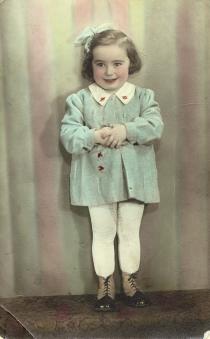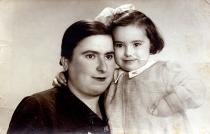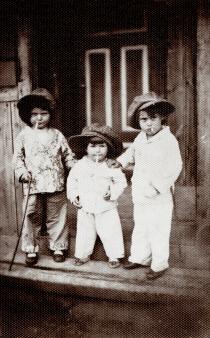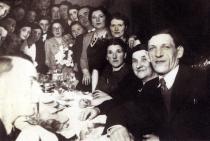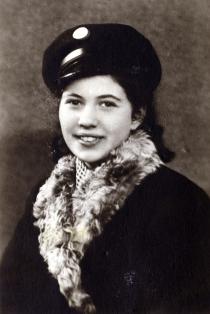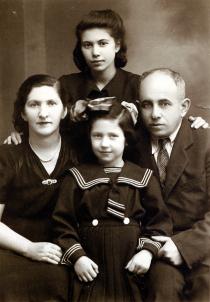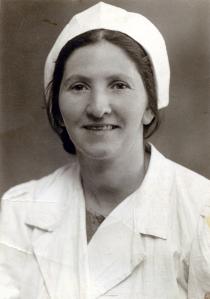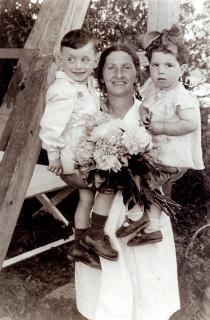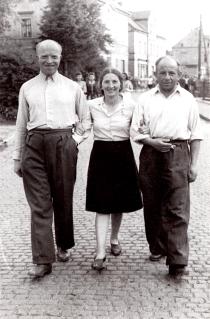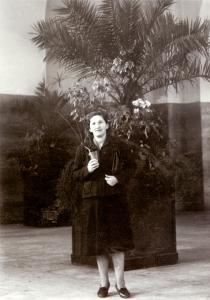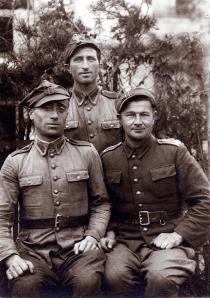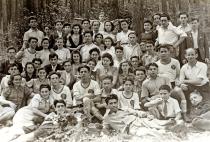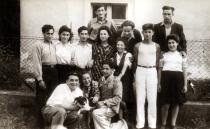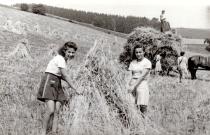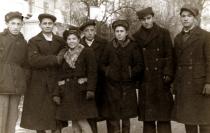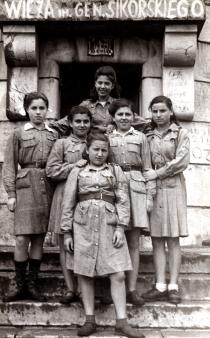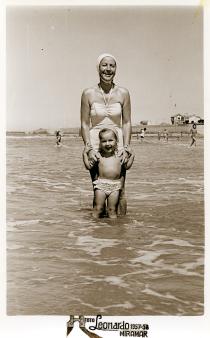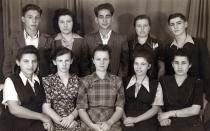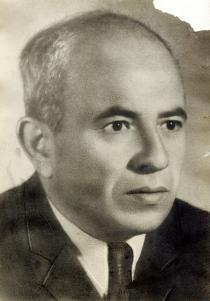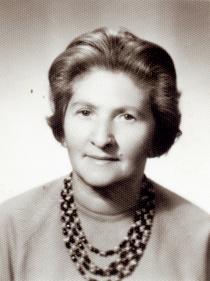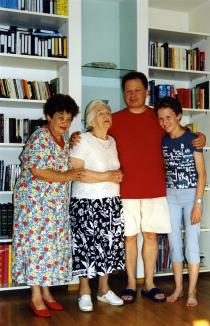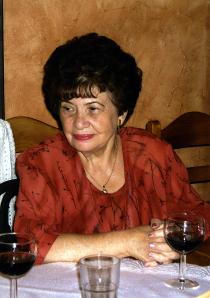
Halina Leszczynska
Warsaw
Poland
Interviewer: Marta Cobel-Tokarska
Date of interview: May-June 2005
Mrs. Leszczynska is a short woman, she dyes her hair brown, she also has brown eyes. She looks amazingly young and energetic. Only after interviewing her mother, Gustawa Birencwajg, did I realize that Mrs. Leszczynska should also be added to the list of Centropa's interviewees. Before the war she was old enough to remember that world. Mrs. Leszczynska's story will be an interesting, symmetrical image of the story of her mother, Mrs. Birencwajg. Mrs. Leszczynska lives with her mother and is devoted to taking care of her. She is not pleased with her life. Although her story is full of humor and funny anecdotes, I could sense her regrets and melancholia. I really got to like Mrs. Leszczynska, we managed to record enough material for an interesting biography during just one meeting.
My name is Halina Leszczynska, nee Birencwajg. I am the daughter of Dawid and Gustawa Birencwajg. I was born on 27th August 1929. Well... now I'll mess up everything, because I don't know what to say.
My family history
Growing up
During the War
After the War
Glossary
My grandmother, Tema Birencwajg [nee Skornicka] came from, I think, Tomasz Mazowiecki [a city approx. 50 km southeast of Lodz] and lived in Sosnowiec [a city in southern Poland, approx. 300 km south of Warsaw]. I had aunts, uncles, relatives there, a lot of family. When I used to come to Sosnowiec, they'd take me from one aunt to another one; I had to kiss them all, which really disgusted me, because they were old aunts. I stopped visiting my grandmother when I started going to school, in 1936. That's when Grandpa died. And it was all over.
We'd visit Grandma for the holidays, but because I was a child then, I'd usually fall asleep. I fell asleep at the table, they undressed me, put me to bed and that was it. I never sat through an entire seder in my life. My grandparents were very pious. I don't know if Grandpa was truly so religious or if it was just for show, for the neighbors and family. He wore a kapote, everything as it should be, a beard. He was sick with asthma, very sick.
My grandfather had this transport corporation, they took goods to merchants in Katowice, Myslowice, Czeladz [cities in southern Poland, in the region of Silesia, some 300 km south of Warsaw]. He liked to spite everyone. For example, on Saturdays, when everyone would go to the prayer house, he'd go, forgive my language, to throw out horse manure, which was not necessary, because he had people who worked for him. But he was just spiteful.
Grandma was fanatically religious. She wore a wig. She was a simple woman, I think she may have been illiterate, because sometimes she'd hold the prayer book upside down, because she couldn't read it anyway, but it was 'vsyo ravno' [Russian for 'doesn't matter'] for her, she had so many things to discuss with God, there was no time to read anything out of the prayer book. I can even tell you these two anecdotes about Grandma' religiosity.
The first one is in connection with Monte Cristo. One of the aunts borrowed a book from a neighbor, it was 'The Count Monte Cristo' [19th century adventure novel by French writer Alexandre Dumas (1802-1870)]. She didn't return it straight away, so this neighbor came to get it and said, 'I've come here for Monte Cristo.' And Grandma exclaimed: 'Oh, dear God, Jesus Christ in my house!'
And the second anecdote is connected with the Red Cross. There were these wooden boxes before the war, with a red cross, those were medicine chests. You'd keep medicines there at home. And the red cross was covered up at my Grandma's house. On Sabbath you couldn't even tear up a piece of paper. You couldn't because tearing was work! Some occupation. And on Friday evenings Grandma would always wear this clean, not new, but clean dress, buttoned up from the top to the bottom, because she wouldn't have managed to put on anything over her head, because she was very stocky. And Sabbath, the entire ceremony would begin.
When I was at Grandma's I sometimes went out to play in the courtyard. My grandmother wore a wig and also fastened this bun to it. She had a huge wardrobe, you could go in and play. So once I took this bun and attached it to my hair and went outside to play. And there was a huge argument, because Grandma couldn't go outside [without the bun].
Grandma was a very good woman, but a simple one. I think she came from Tomasz Mazowiecki. Her maiden name was Skornicka [Editor's note: a typical Polish surname]. If my father had been an illegitimate child, I would have been Leszczynska, nee Skornicka. No one would have suspected who I was [that is, one would have guessed the interviewee was Jewish.]
Grandma has some siblings, I only saw them once in a while, I remember this aunt, that aunt, Uncle Mojsie, but what were their real names... I remember that one relative who I knew was my grandmother's brother, because his name was Skornicki, just like my Grandma. They had this ready-made clothing store in Sosnowiec. I also know that his daughter survived the war and lived in the US, his son also survived, he died soon after my father's death [in the 1960s]. Grandma died during the occupation; unfortunately I don't know any details.
I also remember this detail from my childhood. I was at Grandma's. My father's brother, the only one [Judka Birencwajg], was a communist, who periodically did time in prison, so he wouldn't get bored. Grandma had a large kitchen and a room - that was the entire apartment. A policeman walked in, the caretaker and an informer. And he asked my uncle, 'Are you Mister Birencwajg?' He said 'Yes.' 'Judka?' 'Yes.' 'Come with me, sir.' At this point I thought my grandmother should have flung herself on his neck and cried, 'My dear son, where are they taking you,' ripped her clothing, but something was off. They should have shackled him... And they were so calm, Grandma didn't even get up off the stool she was sitting on. Uncle was filling out some bills, or something, so he left that and went.
I was shocked. That wasn't what I was expecting. Some time later the neighbor's daughter dropped by and said: 'They took your son?' 'Yes.' 'They say he's red.' I was thinking then, how come my uncle is red? Where is he red? I remember that before the war there was this town called Helenow or Helenowek, I don't remember exactly. There was a zoo there, I used to go there with my mom and there were these monkeys there that had red buttocks. I don't know what kind of monkeys those are. But I figured that's where my uncle must have been red.
I was my grandma's oldest granddaughter. Anyway, at that time [in the 1930s] she only had me and one grandson. All in all she had two granddaughters and four grandsons, but no one survived, except for me. They all died.
My father had one brother, Judka, who died after the war [in the 1960s] in Katowice. Then there was Aunt Sala, she married a Mr. Malnowicer. Michal Malnowicer. Then there was Aunt Rachela, she married a Mr. Majtlis, he was called Maks Majtlis, but I don't know what his real name was, maybe Mordka, but I'm not sure. Then there was Aunt Lotka, Laja, who married Chaim Poltorak, who [during WWII] enlisted in the Kosciuszko Division 1 in Russia. After the war he was a military settler [in Lower Silesia], later he went to the US and he died there in an unfortunate accident.
Then there was my youngest aunt, Bluma, who also married a Poltorak [a different one than Laja], I think they were cousins. She died in 1941, because she and her husband were with us in Russia, but she didn't like it, the climate was bad, so she decided to go to the Crimea. We don't know if she ever got there.
So now for Grandmother's grandchildren: Aunt Sala Malnowicer had three sons: what were their real names? I think Ber, Lajb and then Awrum, Abram. Named after my grandfather. Aunt Rachela Majtlis had a daughter named Fryda. And Aunt Lotka, Laja Poltorak, also had a son named Abram. But he was born during the war, his father never saw him, because he was drafted into the Polish army in 1939, he was mobilized and he never saw his son.
For those holidays, I went to my grandparents with my mother. She was really liked there, by my aunts, by Grandma, because she was really the only daughter-in-law in the family. My dad left the house when he was 13 years old, he had some argument with Granddad, I don't remember what about. He found a job in some tavern; I think it was in Piotrkow Trybunalski [city approx. 20 km south of Lodz]. It wasn't then like it is today, you didn't need a degree from some gastronomy school with a specialty in waiting. I don't remember my father ever visiting his parents. I only remember that Dad went to his father's funeral. And as a sign of mourning, the clothing should be cut. But he didn't let anyone do it. He didn't let them destroy his jacket.
Before the war my parents were not very poor, but not very rich either, they made a modest living. Father worked as a waiter, Mother was a saleswoman in a cold cut store, of the Jewish 'Diament' company. Father worked in the 'Tempo' bar and in Gomulinski's confectionery. I don't remember where else. Gomulinski's confectionery was very well known for its donuts, but I don't remember anything more. This 'Tempo' bar was nice, there were tables there, like in a restaurant. Very elegant, not a shady place. But on what street? Oh, I only remember that there was Piotrkowska Street [the main street in Lodz], Zeromskiego where I lived and that's all. I wasn't allowed to go anywhere alone, I walked from school with a friend and if I was even a little bit late Mother would be nervous. When I was out in the courtyard, she'd lean out the window and cry 'Halusia, don't go beyond the gate!'
My father used to bring me Yiddish books. My father was a man with leftist views... he was a member of the freethinkers' movement. [Editor's note: Freethinkers - a social movement supporting the secularization of public life and rationalism in thought, developed in Europe in the 19th and 20th century, the Free Thought Association was created in Poland in the 1920s.] So there were no religious customs at home. No holidays were celebrated, neither Jewish, nor Polish. I never had a Christmas tree in my life, never received money for Channukah. I was raised in a more progressive way, 1st May was an important holiday [1st May, May Day, International Labor Day, celebrated mostly by leftists.]
However, we were not an assimilated family, oh no. My parents spoke Yiddish, I could speak Yiddish very well too. I was an only child [for 11 years], the only child of my mother who had a very difficult childhood, so she wanted to somehow make up for that. So I was a spoiled child, naughty and horrible. How? Well, there was a problem with eating. I remember how my grandfather used to yell at me, 'Swallow it up!' I could wake up with a piece of bread from the previous night's supper in my mouth.
Grandma never visited us. She knew that our house was not kosher. Perhaps that's why she never visited, although she never went anywhere anyway. But Yiddish was spoken at home. I was known for being able to say really nice rhymes in Yiddish. And when we went to visit friends, family, they'd set up a chair for me, have me stand there and say poems in Yiddish. I said them very nicely.
I went to a Jewish preschool and later to a Jewish public school, Medem's school, a Bundist 2 one, that is one with leftist traditions, so there was no religion there. I was an average student, I never put much effort into studying. My school was on Cegielniana Street, it was in a regular tenement house. I don't remember if we even took up an entire floor. I know the school cost several hundred zloty per month, that was the tuition, you had to pay. At least that's what I remember. I don't know exactly.
I know that my headmaster, Mr. Ludwik Lozowski who was a very sick man before the war, survived the war, the occupation and worked in the Ministry of Education after the war, as the director of the ethnic minority schools department.
I only met one person from my class after the war, just one. And even that was a coincidence. In Ciechocinek [a popular health resort in central Poland] I once introduced myself with my maiden name to one lady from Israel. And I heard, 'I had a friend from school once called Halinka Birencwajg.' And I said, 'Where did you live?' - 'In Lodz. I went to the same class with her.' - 'And what school did you go to?' - 'To Medem's' - 'What class were you in?' - 'When the war broke out I was in fourth grade.' And she also said: 'I don't remember anyone else but this Halinka Birencwajg and Ela Jasny.' And I responded: 'Well, you know, I only remember Ela Jasny, because Halinka Birencwajg is standing right before you.'
We both cried, told each other our biographies all week long, what happened during that time. And now, each year, we try to go to Ciechocinek at the same time. Her name before the war was Fela Karp. And now I'd have to look in my notebook where I have all the names and addresses. Yes, Fela Biterman.
I didn't have any Polish friends before the war. Not because there was such an atmosphere [anti-Polish] at home, I was raised in a more international spirit, but there simply weren't any Polish children nearby. There were none. In fact, there were no children my age on our floor. There were only Jews living there and one Pole who happened to be an Endek 3. And when you went out into the courtyard, you didn't look there if the kids were Polish or Jewish, we all played together. I don't remember any names of my friends from school except for Ela Jasny, who died in the ghetto in Lodz 4.
We were living modestly, but we had a radio, a 'Telefunken.' Oh, and I forgot to say that we lived on Zeromskiego Street in Lodz. This was the last address, I was born somewhere else, we later moved, but all I remember is Zeromskiego 67, apartment 22. I remember this until today, because my parents always made sure I knew the address, if I was to get lost somewhere.
It was a three-story tenement house with an outbuilding with lots of additions. The owner of the building was Jewish, there was a Jewish caretaker and very few Polish families lived there. Some stocking makers usually lived in those additions, or whatever they were called. I know they made these really long white stockings. There were all white, perhaps they cut them up later and dyed them, I'm not sure, I wasn't interested in that as a child. I had a long way to school, to Cegielniana Street, you'd walk on foot, no trams, no buses. That was our last apartment in Lodz before the war.
There was a store there as well, the owner lived behind the partition, odds and ends, as you'd say, he had everything. You'd buy from him, I remember, tea, coffee... You could buy half a decagram of coffee, 5 decagram of butter, some candy bought by the piece, cigarettes by the piece. And on Sundays you'd go from the back, on Saturdays it was closed because of Sabbath, on Sundays it had to be closed by law. [Sunday was officially not a workday in Poland]... But he had to make a profit, with two free days it wasn't too good, so [on Sundays] you'd go there from the back and buy whatever you wanted to.
I don't remember if they ever sent me to do the shopping. I remember there was a confectionery on the corner. A cream muffin cost 15 groszy [Polish currency, 1 grosz is 1/100 of 1 zloty] there. This is the only price I remember from before the war. And a tart was 20 groszy. I got the 15 groszy from my mother for that muffin, so I always went there and wished I'd had the 20 groszy for the tart. There were different colors, different shapes. But I would only get the money for that cream muffin. They still make them nowadays, but those back then were better.
I remember the smell of pre-war bread. They made these round loaves in Lodz. There was flour on the bottom and a crunchy crust on top. I didn't like the part with flour, I remember that. I didn't like kaiser rolls, because they pinched me [the hard crust may have irritated the mouth]. They used to bake them then, not steam them.
There was also a laundry at our house. She [the owner] was a German, an older lady, her husband was a Pole, this elderly grandpa. And she had two daughters. One signed the 'Volksliste' [cf. Volksdeutscher] 5 immediately after the war broke out, that is she said she was German, but not the second one. She used to come and complain: 'What is this sister of mine doing?' because she had put up [a picture of] Hitler on display.
I can tell you this anecdote. I have a friend in Canada, she's old, older than me. A long, long time ago, even before the war, her older sister fell ill with the measles and she spent the night with us. To cheer her up, because she couldn't sleep at home, they told us to go to the cinema. Her mother gave her money for the movie. And there was this cinema next to our house, it was called Przedwiosnie. We went to the cinema and there was this movie there called 'Louis Pasteur' about a scientist who performed experiments on dogs. [Editor's note: 'The Story of Louis Pasteur' (1935), directed by William Dieterle, biopic on the French microbiologist who invented pasteurization and made the first vaccine against rabies; the movie won 3 Oscars.]
There were dogs in the photos [on the posters in front of the cinema], so I said I wouldn't go to the cinema, because I was afraid of dogs. She said, 'Oh yes you will, because I won't go back just because of you, I want to see this film.' I said I wouldn't go, but she took me by the collar, led me inside and had me sit down. As a stubborn child, if I had said I wouldn't watch it, that's what I did, I sat through the whole movie with my eyes covered.
Some 50 years later I was with her in Canada... They're intellectuals, they don't watch much TV, they said, 'Let's go to sleep.' I said, 'But there are so many channels' - because in Poland there were just two channels then - so I started changing channels. And I managed to find an old French movie being shown, 'Louis Pasteur.' So she said, 'You know what, you didn't want to watch it then and you just have to watch it now. I'm going to bed. Good night.' I stayed there, with those dogs, I wasn't afraid at all, but I didn't know how to turn it off. I asked, 'Heniu, how do I turn it off?' 'No, you have to see it until the very end.' That's the story.
This friend of mine was called Henia Rozenfarb and her older sister was Chawe Rozenfarb. Chawe is a well known writer; she writes in Yiddish, she even received some prize in Israel for the best book in Yiddish about the ghetto. [Chava Rosenfarb (1923): writer of Yiddish language, recipient of numerous literary prizes. In 1979 she was awarded the Mager Prize - the highest award for Yiddish literature. She lived in Montreal, Canada, for fifty years and now resides in Toronto.]
Before the war they were a Bundist family. Her father was a waiter, just like mine, they knew each other, although they were political enemies and we were always friends. Henia's last name is now Reinhards, she survived the Lodz ghetto, Auschwitz, she later lived in Belgium, then France, I don't remember the order, now she lives in Canada. She currently lives in Toronto. She has a husband, two children, her daughter is some specialist, like a professor or something, specializes in the Old Testament, or maybe the New, I don't know myself. She lectures at university. Her son is a doctor. For many years she used to teach Yiddish, in the Bialik school in Toronto. [Chaim Nakhman Bialik (1873-1934): poet who wrote in Yiddish and Hebrew, called 'the restorer' of Hebrew poetry.] Her husband was a printer, now they are both retired, they are very devoted to popularizing Yiddish in Canada. They have even set up some literary cabaret.
I was younger, she was some three years older. But we lived right next to each other, so we went to the same school. Her duty was to walk me home from school. She wasn't thrilled with that. She had older friends and she had to take this little kid along. And she dragged me... Anyway, I was afraid of a picture of a monkey. So each time I went to their house, she'd stand and go 'grrrr, grrr' and show me that picture. And secondly, I was also afraid of a picture from some handbook, it was a history handbook or a Polish handbook, I'm not sure. Anyway, it was a picture of, I think, prince Witold, from the painting of the Battle of Grunwald [15.07.1410, battle of Polish and Lithuanian forces with the Teutonic Knights, prince Witold was the commander of the Lithuanian army]. He was so terrifying, I was scared, so there was always this Witold waiting for me.
I went to their apartment often, because they had a huge luxury, a large mirror. I didn't have one like it at home. I could stand in front of that mirror for an hour and admire a dress. Henia once wrote me in a letter: 'We had a mirror, but you had a radio. We were always jealous of that radio.'
How did we play in the yard? We played tag, hide and seek, stones, nuts, I don't remember on what holiday we played that game. Stones, this I remember, it was called 'strulki' in Yiddish, you'd throw it and move it, throw it and move it. What the end result was, that I don't remember. If you had some stones in your pile, you had to throw one up in the air and move another one [and catch the first one]. And these nuts, I remember there was a hole and you had to snap your fingers so that the nut would fall into the hole.
Hopscotch. Oh yes, we played hopscotch a lot and you had to have this lucky glass. When you had a colored [piece of] glass, from some bottle, that was a real treasure. And it was lucky, because it always landed, where you wanted it to land. Today I wouldn't be able to play hopscotch well. I don't even remember the rules. I know there was also [a game called] heaven and hell, or something like it. And we played jump rope. Two girls would hold it and the third one jumped. That was so long ago. Really a long time ago.
In 1939 when they called on all men to go and defend Warsaw 6 my dad left. My dad, who at first didn't even want to get out of bed. Mother pulled him out of bed and told him to go, because everybody was going. And we were supposed to all go together, we were standing next to the entrance [of the tenement house] when Dad told Mom to look for her galoshes. I don't know why, it was warm. He told her to look for the galoshes and, for some reasons Mother couldn't find them, although we just had one room. I really don't know how you could have lost galoshes in just one room. Well, but Dad didn't wait for us, he set off on his own. And actually, that was our luck, because we would have surely died along the way, because they were bombing the road, people got lost and so on. Dad went somewhere, we didn't know where.
To be honest, we had nothing to live on, but Mother had a friend who worked in some factory, I think it was the Plihal factory, a textile factory in Lodz. What I remember is that they made underwear. These heavy and coarse underpants, they used to be in fashion, these warms ones, T-shirts, pajamas, such things, though I don't know that much. [Editor's note: in 1893 Leon Plihal founded his dying and textile finishing plant in Lodz. Until the outbreak of WWII L. Plihal and Company, Factory of Knitted Goods and Hosiery produced berets, men's and women's underclothing, sports clothing and knitted products. In 1947 the corporation was nationalized and renamed as the National Knitting Industry Plant number 1 in Lodz and in 1965 was renamed again Femina.]
So this friend of my mother's, I think her name was Cela Krawiecka, but I wouldn't bet my life on it, also died. With her son, who was a talented, very wise, wonderful boy. But I wouldn't bet my life on it. She started bringing us goods, and we would sell them. That's what you do during occupation. At first they tried selling it to friends, but everyone would say: 'Dears, we don't have money ourselves, we don't have enough to live on, so please leave us alone.'
Then Mother met an officer somewhere - from how she describes him, that he had red lapels and red stripes, it seems that he was a general - in the Tempo bar, so the restaurant where my father worked before the war. And this officer bought my mother's entire 'store,' which she carried in one suitcase. And he ordered another one, so he gave us the possibility of paying the rent, paying for electricity, buying some coal. But Mother decided that since Father had left, we didn't have anything to do there.
We didn't know if Father had crossed the border [with the Soviet Union] or not. He only told us, before he left, that if he's alive, if he crosses the border, we should look for him in Bialystok or Lwow. No a very detailed address, is it? And that he'd register in the waiter's union or in MOPR, that was the International Revolutionary Aid Organization 7 And to look for him there.
After a while Mama managed to get some money. There was supposed to be more of it, but some Volksdeutscher bought something from us and then decided it wasn't worth paying, if he didn't have to. And we were on our way. It could have been November 1939. I know that because Jews were not allowed to have money, I had some 20 or 50 zloty hidden in the heel of my shoe. Mother bought me those shoes in the 'Bata' store 8 and a coat, it was too large. We went there, near Warsaw, right after that, but we couldn't cross the border then, we had to spend several more months in Poland, in the area of Siedlce [approx. 50 km east of Warsaw], somewhere near Miedzyrzec [Miedzyrzec Podlaski, approx. 50 km southeast of Siedlce].
I still can't remember, until today, what the name of that village was. This man who was supposed to help us cross the border left us there. I only remember that there was a man named Stasio in that family. There was a housewife called Stasia, then there was this Stasio, and one more aunt, also named Stasia. I only know that I was very scared.
I had already worn that yellow patch 9 in Lodz. My mother was a very brave person, she'd take the patch off and walk around without it. But I would panic. I was afraid to go out on the street in Lodz. I was a very scared, nervous child. And even in that village, when I was there and there were no other children around, then I wouldn't leave the house. And my mother would go somewhere with this Stasia, buy something. But I don't remember who told us to go there in the first place, if this was some acquaintance or some stranger, if this was for money or not... I don't remember, this was time ago, it's unimportant now, what's important is that we are alive.
And later, after several months, I don't know if it was six or seven, since leaving Lodz, we crossed the border near Malkinia. We also went through horrible, stressful situations, because a transport of Jews had arrived at the main train station in Warsaw, I don't know where they were going and where they were from. People were begging for some water, some bread. At some point they [the Germans] opened the door of the car and started loading those Jews who were still on the platform onto the train. We saw a porter and he helped us, because we had some bundle with a quilt, a backpack, I had my schoolbag with me... So we didn't get on that train, but we did get on the next one. And we ended up in Malkinia.
Then we crossed the border there. I'm afraid I'll mess something up ... those nerves... But I only remember that there were some smugglers there, because the border was closed by that time, you couldn't cross it easily, like it used to be. We were following those smuggling women and I fell into a pond. And I was wearing that heavy coat, so it soaked up the water And my mother had also bought me a thick sweat suit... I didn't know it was a pond, I thought it was the sea. I started crying, Mama started yelling and then one woman returned and said, 'Make the child shut up...' We ended up in Zareby Koscielne [town approx. 50 km north of Siedlce, on the other side of the River Bug.] Anyway, Mama remembers better than I what happened there.
So how were we to board the train? We went into the toilet and barricaded ourselves in there, there was no water in there, but after a long time we finally got to Bialystok. And as soon as Mama crossed the border, she got a quart of cold water from some peasant and lost her voice, because of everything. Yes, but we got to Bialystok. And there Mother went to that MOPR , or waiter's union, and she found out that Dad wasn't there.
So we decided to go to Lwow. We had never been in Bialystok before. Mama with me - a ten-year-old child - holding my hand. We couldn't even get a ticket from Bialystok to Lwow. People were lying there on the floor, at the train station. I was really scared, because the Cossacks 10 were there in those long coats, in those high boots, and Mama kept telling me how before World War I a Cossack got into their house through the window... When I saw those Cossacks... That was already in Polesie, in the area of Bialystok, the Russian cavalry was there. And some officer was there, Mama was a young woman, he helped us get a ticket, board the train. [Editor's note: The interviewee means to say that it was easier for a young woman to get help along the way.]
All in all, we ended up in Lwow. Since that moment, I remember everything better. We arrived in Lwow at night. We had never been to Lwow before, now can you imagine a woman with a child and a bundle of clothing standing at the train station in the middle of the night and not knowing whether to turn left or right. The civic militiamen were there, the ORMO [a formation created in the Soviet occupied territories, which took over law enforcement duties]. A man came up and asked, 'You're walking around with a child at night?' Mama said, 'I've come from Lodz.' And it turned out that he was from Lodz as well, a refugee. And he said, 'You know, all these politicals, they stay at the former Brygidki prison.' [Editor's note: Originally a nunnery of Saint Brygida's order of nuns, brought to Lwow in 1614. A male prison was organized there in 1782. After the Red Army entered Lwow in 1939 Brygidki became an NKVD prison.]
He led us up to this Brygidki, but from a different side! From the side he entered on, it was the army barracks, as it turned out, for Soviet soldiers. So we knocked on that gate and, I remember, a soldier appeared, in a fur coat, wearing a 'budenovka' covering his ears, with a rifle with this bayonet. [Editor's note: 'budenovka' - from the name of the Soviet marshal Semyon Mikhailovic Budyonny, the name for a high hat worn by Soviet soldiers, decorated with a large colorful star with a small metal star- emblem.] We didn't speak any Russian, he wasn't speaking any Polish and we couldn't talk, so he closed the door. But this militiaman came back and told us to go from the other side.
We did and it turned out that it was the MOPR, indeed. And there, dear God, people were sleeping on the floor, on sheets of paper. This woman with a child said, 'What have you done? Why did you come here?' Because when you were here [on Polish lands occupied by the Soviets], then you didn't know what was happening there [on Polish lands occupied by the Germans], that there were such horrible restrictions, that you couldn't have any money, that you couldn't take a train... And several months had already passed since we left Lodz, a ghetto was there. Somehow we managed to slip away.
In the morning Mama left me and went looking for Dad. As always, she told me to sit on this bundle of ours, I remember the words: 'Even if someone with a golden head came and said - your daddy asked you, your mommy asked you to go - you're not supposed to move.' So I listened to her. After a while Mama came back with Daddy. There are these passages in Lwow, with several gates, one gate is on one street, then another one on a second street. So Mama entered and exited at a different place, she didn't know where she ended up, she couldn't have known where she was anyway, because we had never been in Lwow before.
Some man was standing there and she wanted to show him this piece of paper where she had written down what she was looking for - because she had lost her voice, so it was all on a piece of paper - and this happened to be the only person in the world who knew where my daddy was. It was the friend with whom Daddy had left Lodz. I don't remember what his name was. And supposedly Daddy also spent the first night there and didn't even know what street it was on, because one of the customers from his restaurant took him in [for the night].
We later found three of Father's brothers-in-law and his sister in Lwow. That was Dad's youngest sister, Bluma, with this Poltorak husband of hers, and the second Poltorak, Chaim... But without his wife [the wife was the father's sister, Laja] ... because they thought that during World War I there had been Germans as well and it was possible to survive and it wasn't bad... [so there was no need to escape from territories occupied by the Germans]. Even Aunt Rachela arrived in Lwow, but without her child. If she had come with the child, we wouldn't have let her go back no matter what. Because she came, saw that we were all sleeping on the floor 'zusammen' [German for 'together'] and said, 'Have you all gone mad?' She went back. And this third brother-in-law was Malnowicer Michal.
We had to find some apartment, but that was impossible at the time in Lwow. I know that we spent one night sleeping under the sink in someone's kitchen, we later rented such a walk-through hallway... We were living there: I, Dad, Mom, Father's sister with her husband. I don't remember if those two brothers-in-law were with us there as well. We had these frames made of boards, we put in some straw and that's how we slept. There was no way to get me enrolled in any school in Lwow, because it was overcrowded, it wasn't life.
And then these deportations from Lwow began 11. Especially of those who had run away from the Germans, because they were all treated like spies. German spies who had come to lands occupied by the Soviet Union. At that time various plants from Russia started sending their representatives out there to recruit people to work. Nobody imagined the war would take as long as it did, they all thought 'we'll get through the winter and head back.'
So Dad went to one of these offices and the first recruiter that was there recruited us, he must have been quite good. We were only afraid of going somewhere to the countryside, we didn't want to go to a kolkhoz 12, because we were from the city. Oh, he said, 'bolshoy gorod, factories, zavod [Russian: 'nice city, factories, plants'], everything is there.' 'Bolshoy gorod' - so we went there. We signed up for this with our entire family. That's how we avoided Kazakhstan and Siberia, because they would have taken us for sure.
So we went. We were just surprised that the representative of that 'zavod' [Russian for 'factory'], kept buying things along the way. Why did he need to buy things, if everything was already there? We came to the town, it was called Vyksa, in the Gorki district. [Editor's note: until 1932 the district city was called Nizhny Novgorod, in the period 1932-1991 Gorki, after 1991 the name Nizhny Novgorod was restored, the city is located approx. 350 km east of Moscow, on the Volga River].
A small town, I can't say how many inhabitants there were, I wasn't particularly interested. The houses were mostly wooden, single-story or two- story, but there was a large ironworks, a sawmill, there was also a rolling bearings factory. An industrial town, but everyone lived in their own wooden house, had a cow, that's how they lived. I always say that this was the kind of city where there was a goat steering the traffic at the main intersection, with its tail - left and right.
We were a bit surprised, disappointed, it wasn't the kind of 'gorod' we thought it would be and we saw how poor those people were. They would wear 'lapcie,' now a Russian doesn't even know that that was. But those were these shoes made of lime bark. They made all of us who came on that transport, several Polish families, mostly Jews, live in wooden single- story barracks. They put the bachelors in a so-called 'obshchezhitye,' a workers' hotel. They brought in products on trucks, but we didn't know that we should buy more to have some food on reserve. This Jew, Blumkin, was surprised that we were buying so little.
I signed up for school, for 4th grade. It was almost the end of the school year, summer, I got stuck in that 4th grade, because I didn't know what was happening. I didn't understand a word, I simply copied the letters from the blackboard. Everything was in Russian [the Russian alphabet differs from the Latin alphabet]. I didn't get promoted and I had to repeat 4th grade. And I kept attending that school number three 13.
I went to a pioneer camp 14, like all children did. Then the war broke out 15 and it was very hard, not just for us, but for everyone. There were no notebooks. You had to write on newspapers, but there also weren't enough newspapers. When the ZPP 16 was created, we received newspapers, they sent us 'Nowe Widnokregi' ['New Horizons'] and 'Wolna Polska' [ 'Free Poland'], so we had something to write on then. Because you literally had to write on old books, between the lines... We had nothing. To get ink, you'd buy an old pencil at the market, smash it up, mix it with water and that's how you got ink.
We managed to get by only thanks to my mother's wit, she'd exchange this and that, we'd always have something. We'd get bread, so we'd try to save one loaf per week and then exchange it for milk. Because my little sister [Cetka], the only one I have, was born in 1940. I used to dream that once the war was over, I'd buy myself a kilo of butter, make this hole in the middle, pour in a kilo of sugar, mix it all up and eat it with a spoon. Now I don't eat fatty and sweet things at all.
My sister only had two pairs of underwear, I used to go to school in my father's shoes, one was gray and the other one brown. I had a beautiful coat made from a blanket and the lining was made from a yellow drape, from before the war. You had to bring your own ink to school, in a special ink- pot, this 'chernelnitsa' [Russian for 'ink-pot'] tipped over in my pocket and during our entire stay in Russia I had to carry my book-bag on my left side to cover up the [ink] stain.
I didn't have any Polish friends my age. So I learned Russian quickly, it was worse with my parents. All in all, I had many girl-friends there and until recently, until the change here [the change of the system in Poland in 1989] 17. I even corresponded with them and would sometimes meet them, but in Moscow. No foreigners were allowed to go there [to the town where the family spent the war], because the defense industry was there, although everyone knew about it. They started producing during the war, you couldn't sleep, because these armored cars would drive by and half of the town worked there... but supposedly this was a huge military secret.
Mother used to work in the ironworks first, but the paramedics took her from that place and she later worked in a nursery, doing three shifts. It was quite far away, there was no public transport. In the summer she'd walk on sand, next to barracks where deported Ukrainians were living and in the wintertime, she'd walk in the snow. There were no bombings of the town, but when the planes were flying to Gorki, because there were automobile factories there, Mother had to go to work, because if something happened the children would have to be evacuated. And I stayed home with my sister and put on all the most expensive things. My father's shoes, my mother's coat, made from my father's coat, bundled up my sister in a quilt which we managed to save from Mom's bundle and I left the house with her, so I wouldn't be in the building, if it was to collapse. And we'd just look: 'Nashyi, nie nashyi, kto letit?' [Russian for 'ours or not ours, who's flying?']
You had to stand in line for three days to get bread. It was black bread, these square loaves, there was straw and bran in it too, lots of things. You had to wait in line and when you left the bakery, the crowd would almost trample you, so you'd hold the bread close to your chest. And we had a plot of land. We planted potatoes there. The first time we did it, Mom and Dad were glad that the potatoes were so high, but it turned out there was nothing underneath them. And later there were three boards under my bed and we'd store potatoes there. My parents stopped planting them, we bought potatoes later on.
We also had a pig. Each pig in our town was named Zhenka. We didn't have anything to feed her with, we gave her potato peels and this pig grew up to look like a dachshund. Long and thin. My dad kept saying that he'd kill the pig and Mama begged him to keep the pig a little longer. If that wasn't enough, the pig had some problem with its esophagus; it could only eat mashed food. There was more work with this pig than it was worth.
There was no water, no running water, you had to carry water from a well. There was a pump, so if you poured some water in the wintertime, you'd end up with an ice hill and you couldn't reach the pump. When you managed to get a bucket of water, then before you got past this hill, half of the bucket would spill. And the ice hill kept getting larger, because of that spilled water.
When you needed wood, you had to go to the forest and they'd tell you there which pine tree was yours [to cut down]. You had to cut it up, chop off the branches, into meter-long parts and then bring it all back. This was all very complicated. Dad worked on a steam locomotive, as the train driver's helper, but it wasn't a long distance train, just a local one. So each day Father would knock a chunk of wood [off the train] and later, after work, he'd go look for it and bring this heavy chunk of wood home. That's why he died of a heart attack when he was 62.
There was often no electricity, so we had mazout in a bottle, a wick made from a rag and we'd burn that. If you put your finger in your nose, this finger would turn black, the ceiling was black from smoke as well. It was very hard, but the brass band would play in the park. People would go dancing.
I was only in the 8th or 9th grade [there was a 10-year elementary school in the Soviet system of education], when we left. I don't remember. Dad was recruited into the Polish Army 18, but after three days he came back. Because he worked on the railroad and they had a so-called reserve for railroad workers, so they turned them back, because they were needed for work. Anyway, they wouldn't have sent him to the front anyway. Father was not fit for military service, he was missing half a finger. And going to the 'trudfront' 19 was something horrible, people would die of hunger there.
Even though it was cold there and there was great hunger, I know it was hard for everybody, not just for us, for the locals as well. And the people were very friendly towards us. When we arrived, for some reasons they called all of us Belarusians: 'Byelorusy pryekhaly Byelorusy.' They felt sorry for us: 'Oh, you had to leave', they said that we didn't have a homeland. They tried to help us.
I remember that because I could speak Russian best, Mama sent me to borrow a frying pan. A frying pan was called [in Russian] 'skovorodka.' I kept repeating along the way: 'skovorodka, skovorodka,' but when I got there, I got confused and said 'kosovorotka.' Kosovorotka is a shirt, an old type of shirt, nowadays only worn by folk dancers. With buttons and a starched up collar. But then everyone used to wear this. The woman was surprised that I wanted this 'kosovorotka,' but she thought that perhaps my father didn't have a shirt. She opened her trunk, because she didn't have a cupboard, and gave me this 'kosovorotka.' I came home and they asked me, 'Where's the frying pan?' 'They didn't give it to me, they only gave me this.'
Father's brother, Judka Birencwajg, also found himself in Russia after some time. He lived with us, in a different apartment in the same building. I remember that my uncle married a Russian there... He wanted her to 'pshybrala pokrugulke' [incorrect Russian: 'to sew on a button']. Instead of saying 'pugovitsa' - a button, he said 'pokrugulka' [there is no such word in Russian]. She was worried, because she didn't know what he was talking about and he kept asking: 'How many times do I have to ask you for this pokrugulka' There were such funny stories.
I remember the first time I went to a pioneer camp, they always put the menu out on display. And in the menu there was - 'prostokvasha' [Russian for 'sour milk'] as an afternoon snack. I had this friend, Lusia, Lusia Wojtiuk, her father was a Pole, but he didn't speak any Polish, because he had left before that war [WWI]. Lusia was my interpreter. So I asked her: 'Lusia, what is this protsokvasha?' I kept asking her about the meaning of words all the time, so she was fed up with me and said, 'A zhopa, to ty panimayesh, a prostokvasha ne panimayesh?' [Russian: 'you understand [the word] ass and you don't understand sour milk?']. And then I saw that it was just sour milk. I had imagined some cake, some dessert. But I still have warm memories of that. I've somehow forgotten all the bad things. That's somehow erased from my memory and all I remember are the good and funny things.
So that's how we made it until 1946. My mama discovered the ZPP, Union of Polish Patriots, when she was sent to Gorki because of her work. So there was some institution, which could help. And in 1946 we were repatriated. I really cried, because it was difficult for me to leave my friends. I had good grades, maybe I was the best student at math, although I wasn't good at it before the war.
In 1946 we arrived on the Regained Territories 20. We had to travel in those cattle wagons again, it took a very long time. And my mother, she was very unlucky, as soon as she boarded the train, a pot full of boiling water spilled over on her leg and she suffered along the way, because she had burned her leg. Lice kept biting us. Very elegant.
Our transport was supposed to go to Szczecinek [a city in northwestern Poland, approx. 80 km west of Szczecin], but something broke along the way and they sent us to Lower Silesia 21. We stopped for a while in Lodz and I got off the train, I remember there was this girl there in nice knee-high stockings, dressed smartly... and I was there in this heavy coat and a head kerchief, so I felt horrible, we got on the train again and kept going. All the people would leave somewhere along the way, one got off there, another one there. There was almost no one left on the train, but my dad kept saying, 'They assigned for us to go there, they're waiting for us, that's where we have to go.'
Mother got off at one of the stations, she could have been changing the wound dressing on her leg, I don't remember, and she found out that there were lots of Jews there. And there she met one of those brothers-in-law who was with us in Lwow and later in Russia. He was working very hard in the ironworks and he volunteered to go to the Kosciuszko Division. And she found him there, he was a military settler. His name was Chaim Poltorak.
When he saw us he said, 'You're not going anywhere further, get off the train, I'll come and get you in a carriage.' We said to each other, 'Has he gone mad?' but he really did come and get us in a carriage, with a driver and a coat-of-arms on the side, it was from an estate which used to belong to the Germans. He took us to a little house and told us: 'you'll live here.' As soon as we got there, I sat on the bed, because I was so tired and it turned out I had sat down on a mirror and the mirror broke. This was really hard for me, because I had dreamed of having a mirror all my life.
We didn't stay there long. In 1946 everything had been looted. You could still find a table, a cupboard or a chair somewhere. My parents met many people from Lodz there. We moved to a street that was called Bieruta Street, but I don't remember the number. There were mostly people from Lodz living there. There were these buildings for German officers there, they were empty and people didn't have families and were looking for a kind soul. It was a small town, Pieszyce [a town approx. 50 km southwest of Wroclaw, 5 km west of Dzierzoniow. In the middle ages it was known as Pieszyce, later, when it was part of Germany as Peterswald, after WWII the town became a part of Poland again as Piotrolesie. In 1947 the name Pieszyce was restored.]
Later I moved to Dzierzoniow, to a dormitory. And I have to say that the years I spent in the dormitory in Dzierzoniow and later in Wroclaw were the best years of my life. I am still in touch with all the friends from that period. When I went to Israel, there was an entire reunion there! Most of them didn't have families. There weren't many who, like me, had both parents. They were mostly orphans, from the ghetto, from the partisan units, or from Russia. Some had been in hiding. We never asked about anyone how he had survived the war. Why? I don't know, everyone was happy to be there and that was it.
I went to that dormitory and I enrolled in a gymnasium. I went to the Sniadeckich gymnasium. I had problems with Polish, because I hadn't been studying it. I was very good at math, but when I said that they had forgotten about the 'pierpendikular' [Russian for 'perpendicular'], the entire class had a good laugh. It was 'prostopadla' [Polish for 'perpendicular']. Or that 'diagonal' was 'przekatna' [Polish for 'diagonal']. But I tutored my classmates in math, because the standard in the Russian school had been much higher than in Poland at that time.
There were several Jewish girls in the class and we were all good students. But we were all a bit older than the other children. We belonged to the ZWM, Union of Youth Fighters 22, although there were many Zionist organizations there, and the Bund. There were always discussions in the dorm at night, because everyone belonged to some organization. Now we've all settled down, but at that time we were all very idealistic.
You could learn to be a radio technician at that school, there was a Dior factory [a radio factory] in Dzierzoniow, so they'd give you work. You could be a radio technician, a locksmith, learn some sewing, unstitching, as we called it, dressmaking courses for girls. Everyone spoke Jewish [Yiddish], Russian, Polish. There were dances organized every night. We had several German records and we kept playing them on the record player over and over.
I remember several names. Grisza Kresl, now he's got a different name, so I couldn't locate him in Israel. He's a very rich man, he's got some philatelist company, he's received some awards for some Polish stamp of his. Bronia Guz, she's now a retired physician. Zenia Marder, her last name is now Pelc, she's a retired chemical engineer. We're all retired by now. Zula Smieciuchowska has died. Henio Bejman is in Israel. Roza Mankiet lives in Israel too, Cyla Szwarc lives in Australia. Sara Elbam also lives in Israel. Ala Lewi, she attended that gymnasium in Dzierzoniow as well, has died, supposedly she died in Australia. Chaskiel Achtelberg worked in a textile factory, as did Szajman, as I said, there were all kinds of young people there. Now they're all in Israel. My friend Cesia Golab, her last name is now Staroswiecka, is also in Israel.
As far as I know only I am in Poland, and Felek Nieznanowski. Nobody else. They've all left. And this one is dead, that one is dead. Lots of dead ones. Jozio Kwiatkowski died in Poland, Benio Gdalewicz died in Belgium, Danek in Poland, Lowa died in Israel...
And then we found out that there were these University Preparatory Courses. They were organized for so-called peasant and working-class youth, who were delayed, hadn't graduated from high school yet. It took two years and then you could go to university, although they didn't give you a high-school diploma. So it was, either you go to university, or you have nothing. It was quite competitive. Many of us started it, but only a few finished. The level was varied. So I went to Wroclaw and lived in a dorm there.
I met my [future] husband, Jan Leszczynski, during this preparatory course. My husband was a Pole, he came from Koluszki [20 km west of Lodz]. He was working on the railroad and taking that course. He wrote my Latin tests for me, because I had never studied Latin, he corrected my Polish and I wrote his Russian lessons for him and corrected his mathematics.
Meanwhile my parents had moved to Warsaw. At first they had a room with a shared kitchen. Dad worked at a hospital, which was being built on Woloska Street. Mama worked at some preschool. They were really sad that I was in Wroclaw in some dorm, but when I had to go [visit my parents] for the holidays, I'd think 'Dear God, everybody's staying, there'll be singing and dancing, and I have to be here [in Warsaw].'
The conditions in that dorm were so-so, there were five or six of us in one room, but because nobody had ever known better conditions, I wasn't bothered at all by it. It was co-educational, you had male and female friends. Some of them were studying, others were taking these ORT 23 courses, which existed even before the war. Creative Workers' Organization? No, I don't remember what this acronym stands for, but those who are interested in Jewish institutions will know.
There were no differences, whether you were educated or not, everyone was together, 'zusammen.' And we were all doing very well, both in Dzierzoniow and then in Wroclaw. A university student and someone who had just graduated from a gymnasium would be living together in one room and one would help the other...
I spent one year in Wroclaw, but my parents were very sad that I was not at home, so I went to Warsaw. Especially since they got a two-room apartment on Madalinskiego Street. I continued taking that two-year preparatory course in Warsaw, it was in the building of the Warsaw Institute of Technology. After one year I decided to enroll in Russian Philology [at university]. Why Russian? Because I knew it would be the easiest for me. I remember an article in 'Nowe Drogi' [ 'New Roads,' a monthly publication of the Polish United Workers' Party] where they wrote that they were opening the Russian Philology Faculty and that there were no candidates.
Leszczynski stayed in Wroclaw. But because he was a railroad worker, he could travel for free and he visited me often. He wanted to study law, at the Duracz school. It was a school which prepared lawyers quickly. Anyway, we got married. Shortly after that my son was born [Wlodzimierz Leszczynski was born on 24th December 1951]. I was in my second year of university studies when I gave birth to my son, my parents were still supporting me financially, so we weren't doing too well. The child was still a baby and we were living with my parents on Madalinskiego Street.
I graduated from the first level of university [three-year college]. There were a few other Jewish girls at university, the atmosphere was nice. But I finished college quite early, in 1953 or 1954. My husband was completing his education as well, working in the Warsaw prosecutor's office; he was even the head prosecutor for Warsaw-South.
When I graduated from college I was assigned to be a teacher at the Krolowa Jadwiga gymnasium, on Woronicza Street. I got that work assignment in September and in October my husband got an apartment in Zoliborz [district of Warsaw], on Smiala Street. One room with a kitchen, but it was the best apartment among all our friends, who were living in a dorm in Warsaw. Later, when they shut that dorm down, they kept on living there [in that building]. In a room this size [Mrs. Leszczynska shows the size of the room we are meeting in, about 3 meters by 3 meters] there would be a wife and a husband, children would be born, there were no bathrooms there, no bathtub, no shower, just a toilet somewhere at the end of a hallway, they'd cook on an electric stove.
So our apartment was a luxury, paradise. And all the parties took place at our apartment. But my marriage was not a happy one. I split up with my husband after a while. Perhaps we were too stupid, too young for all that. Anyway, it didn't work out for us.
Then the child went to preschool and I changed [workplaces] to Zoliborz. It was an 11-year school [elementary school, grades 1 to 11], number 13 on Siemiradzkiego Street, currently the Lelewel high school. I worked there for 19 years. That's where 1968 24 found me. If I hadn't been reading the papers and watching television, listening to the radio, I wouldn't have encountered any anti-Semitism. I am honest about this. There was a very, very nice atmosphere at work. It was a TPD [Friends of Children Association, a Polish NGO, created in 1949, which organized schools, summer camps and after school activities for children] school, no religion, so you didn't feel that one was this, the other one that [there was no discrimination of Jewish children], we all felt comfortable.
Meanwhile I was also the director of TSKZ 25 summer camps for youth and children. I was promoted in 1967. I was moved to the Institute for Teacher Training and Educational Research, as a methodologist. I also worked in the high school for several more years, because I had to have several hours a week of practical work. In 1968, at the worst time possible, I was promoted to being the director of the foreign languages team. I don't know if my friends did this to spite me? I started working on my Master's degree in 1966, extramural studies. That's where I worked until I retired. I retired in 1988.
My father died in 1966. I can tell you something more about his character. He was a great formalist and a bit of a political fanatic. He whole- heartedly believed in socialism. He wouldn't read any other newspaper than 'Trybuna Ludu' [a daily paper published in post-war Poland, publication of the Polish United Workers' Party]. He wouldn't listen to any other radio station but Channel One. He surely didn't listen to forbidden radio stations like Wolna Europa or foreign stations 26. And when someone said that something was not right [that is, when someone criticized the socialist system], he was his enemy for life. And we used to say that it was good that Dad didn't live to see all that [the events of 1968 and 1989] 27, because he wouldn't have survived it. He was very happy, for example when they opened the WZ route [the East-West highway in Warsaw, an investment realized in 1947-1949], he walked along it.
And he believed that if you manage to produce a specific amount of crude iron, that it's a great achievement. That if you manage to excavate a specific amount of coal... He would sit in front of the TV and watch children from Silesia perform and sing. Some band from Katowice or from Dabrowa Gornicza. Because he knew what conditions miners' children used to live in before the war, what kind of poverty, dirt and stench there was. And he was so glad. He was so happy with each achievement. He didn't stop to consider that someone up at the top could be stealing, could be dishonest.
At the end of his life, he was working at 'Stolica,' a building corporation, as a warehouse worker. I remember that when he died, and he wasn't any great figure, many people came to say good-bye, workers and the director made a speech and said that he always 'protected public money.' I remember that. He used to say that himself. He was very honest, even too much. He was a minimalist, he didn't need much himself.
He always held it against me that I tutored students [to earn additional money]. 'You'll manage somehow. You'll live from what you earn, at this level.' It was very hard. Yes, very hard. Because when mother said something, he'd reply, 'If you talk so much, I'll get a job that pays even less than this one.' He took however much they paid him and we had to live from that. It was not important for him that someone had more. That's how he always was. He wasn't an educated man, but he read a lot. He used to read fiction, the classics. He was enlightened, though not educated.
And then, after my father died, we decided to switch apartments and move in with my mother. That wasn't easy to do, because they almost ran around with a measuring stick, that it was too much space for three people. [Editor's note: in post-war Poland apartments were assigned and the area allowable per one person was restricted, therefore all exchanges of apartments were difficult.] We did get an apartment, after all, though the total area of the apartments we had to turn in was greater than the one we got, mother's two rooms on Madalinskiego Street and our one room in Zoliborz.
After Dad died I suspended my studies for one year, because of the move, and my mother was in bad shape. Depressed. In 1968 I got my Master's degree, I remember I needed a special permit to enter the campus. I wrote my Master's thesis, I passed the final exam, all was well.
I can tell you something more about my sister. There's an eleven-year age difference between us. I was 17 when she was six. Cetka went to Warsaw with our parents, she graduated from nursing school. She later worked in the hospital on Woloska Street and then moved to what was called the 'Veterans of the Workers' Movement House.' Later, after these changes took place in Poland [in 1989], they changed it from veterans of the workers' movement to 'Senior Physicians,' now they only accept retired doctors. She worked there for 38 years. She has only retired this year [2005].
As the head nurse she married a Mr. Bogdan Wojcik, she later divorced him, she has a daughter named Katarzyna and two granddaughters, Natalia and Joanna. Natalia has just submitted the paperwork to a high school; Joanna will be taking the high school entrance exam next year. Kasia's husband, S.D. [Mrs. Leszczynska asked to keep his name confidential] is a very kind, wonderful man.
My son Wlodzimierz was a very good student, he didn't have any problems getting into the faculty of law at university and he graduated on time. He went to work at Bank Handlowy. He worked there for quite a long time. Later he got kicked up [promoted]. At first they sent him to Berlin - it was still West Berlin then.
He managed to marry in the meantime. My daughter-in-law, Marysia, is also Polish. So there's no prejudice among us. My son didn't have a church wedding. His father-in-law used to be a prisoner of Auschwitz, he had a very low number, one of the first prisoners. My son's in-laws are not alive now. When my son got married he also lived with his in-laws [like I lived with my parents], because he didn't have an apartment. He later got an apartment in Ursynow [district of Warsaw].
Later my son was sent to Luxembourg, where he was the director of Bank Handlowy. He is still in Luxembourg, but he is not the director of Bank Handlowy any longer, he now has his own consulting company, I can never remember the full name. [Wlodzimierz Leszczynski is the director of the EuroAccess SA company in Luxembourg, which deals with the financing of investments.] He sometimes writes pieces for 'Gazeta Bankowa' ['Banking Gazette']...
Well, I have one grandson. His name is Janusz. He is 27 years old, he lives in Warsaw, he went to university in London, because when they were living in Luxembourg and Wlodek was the director of a bank, he could afford to educate his son in London. Janusz is now working in Warsaw, I can't remember where. Why is his name Janusz? Well, mostly in honor of Janusz Korczak 28, that's why we decided to name him that. My granddaughter Zosia is in Luxembourg, she'll be graduating from high school next year. Zosia - just because it's such a pretty name. Zofia Maria Leszczynska, we decided it sounds nice. Both of my grandchildren have not been baptized.
I only visited Israel once, one time, my friends paid for it. I liked it a lot. But it's different when you are there as a guest. I lived in eight different places, they welcomed me everywhere, showed me around, but I don't know what would have happened if I had to stay there alone. I was there at a time when it wasn't so hot, so I didn't suffer from the heat. Everywhere: 'I'll come and get you tomorrow, tomorrow you'll go there.' When I arrived at my friend's house the first evening, all my other friends visited her and started arranging something in the kitchen. I asked, 'What's happening here?' 'We're making a schedule who you're staying with when.' I don't know Hebrew, I never learned it. But when I was in Israel I didn't need it, everyone spoke Polish, well, everyone in the circles I was in. They're all very well off. But they all have good professions.
Where did I finish, I'm getting near the end now. I live with my mother [Gustawa Birencwajg]. I don't have a good old-age pension, a teacher's pension, I didn't work overtime, but I did manage to write several handbooks for studying Russian. I started off with cartoons, later adaptations [of classic books], later, as a co-author, we wrote some handbooks and then I did that on my own. But the school system reform has just begun, so all my textbooks are useless now, nobody's learning from them.
For some time after I retired I kept working. At first I worked part-time at the Institute, at my old workplace, because I was a senior lecturer there. I later worked in a private college, an economics-computers college. I worked there for a few years, but I gave that up, because I only had a few hours a week there, it wasn't worth the trouble of going back and forth. I also did private tutoring at home then. Now I don't have school, tutoring, nothing. 'Vsyo' [Russian for 'everything'] is over. I don't even have the fees for the textbooks.
But I have to say that I didn't have any anti-Semitic problems all my life. Not at school in Silesia, there were several of us, Jews, there and we were all good students. Now they're doctors, engineers. Not at university, where there were a few of us as well. The relations were very good at university. I had it very good at work too. When I got there in tears, nervous, in 1968, because I had watched television... they'd say: 'why the heck are you watching TV?' I didn't have a telephone at home then, so they'd phone me at work and say, 'Please tell Halina to be at the Gdanski Train Station at this and that hour,' because they were leaving [the March 1968 refugees went abroad departing from the Gdanski Train station]. My secretary once said: 'Please leave this poor woman alone, God bless you and leave her in peace, because you're making her nervous each week.'
Once some speaker visited the school and everyone was supposed to go to a room and listen to the speaker. My principal didn't know what the topic would be, so he told me to stay in the teachers' lounge. It turned out to be about Radio Free Europe, so something completely different, not about Jews. My friend, the current vice-minister [of education], Anna Radziwill, used to say, 'Don't worry, look at how bad they've been to us [people from aristocratic families], but we're still here, we're not leaving.' I visited her once and one of the guests asked, 'Why are you so sad?' and she said that all her friends have left. And he said, 'Well, stay here just out of spite! After all, what will happen when all the decent people leave and we're left only with scoundrels?'
I only had two anti-Semitic incidents. Once I was walking along Pulawska Street, when they were building this, what's it called, a multiplex [a multi-screen cinema]. And some woman walked up to me and asked, 'Do you know who built this?' I said, 'No, I don't.' 'A Jew built it.' 'Well, I'm glad a Jew built it.' 'You know what, I'm sure there will be thefts here...' I asked, 'Why do you think so?' 'Well, don't you know Jews?' I said, 'Yes, I do know Jews, in fact I'm a Jew myself.' And I told her using very vulgar language: 'I'm a Jewess and you can kiss my Jewish ass.' And I kept on walking.
And another time, I was at an outdoor market, there was this woman standing there and she started saying, 'You know, all these Jews keep coming here, because there's no place like Poland for them to do business.' I said, 'Stop this nonsense.' She asked, 'Are you a Jew?' I said, 'Yes.' And I added, 'You can go to your church, stand in front of the picture of the Holy Mary and tell her the same thing you told me: You Jew.'
Now I am 76 years of age. Whether one likes it or not, well, I like it the least. I didn't remarry. No one suggested it to me. Perhaps I would have considered it. I have a good son, but he's got his family, his own problems. I have a sister here, nearby, she lives 5 minutes away from me. She's also got a daughter. But her daughter has her own family, two grown daughters. One of them is starting high school this year, the other one next year.
My sister is also married to a Pole. We degenerated [got married to non- Jews] perhaps because there was no other solution. My friends in Israel ask me, 'Why did your son marry a Pole?' Well, was he supposed to be a bachelor all his life? He met her during some sailing trip, organized by Doctor Andrzej Jaczewski, now a well known sexologist. They're a very good couple, they've been together for almost 30 years.
Our children hold it against us that there were no traditions, no Jewish holidays. I remember that when my son once wanted me to celebrate Christmas Eve, I baked him a goose [no meat is eaten during the Christmas Eve supper, the most important meal of the Christmas holidays in Poland], because how was I supposed to know what it was supposed to look like. My husband, even though he was Polish, never bothered with this stuff either. And I spent my first real Christmas Eve at my daughter-in-law's. Because she had parents, so she wanted to follow traditions. And now we celebrate Christmas Eve each year at my niece's place [Cetka's daughter], she's also married to a Pole. But without all these religious things. Everyone likes coming to the Christmas Eve supper, because they all get presents. There's always a huge Christmas tree, reaching the ceiling, everyone wishes all the best to everyone else... and that's it.
My Jewishness really consists of going to TSKZ once a year and buying matzah. Because I don't really know much about the Jewish holidays. From time to time I go to the TSKZ. It's kind of like going to some nursing home, a seniors' home. I went there once for seder, but I didn't stay until the end, because I would have missed the last tram back home. There was no subway there yet, so I couldn't have taken it.
My grandson Janusz is interested in Jewish tradition. I buy him all kinds of books about Judaism and he likes to read them. When he was in London, he used to go to meetings of the Jewish students' association. I even asked him, 'Why do you do it?' He said, 'Because there are interesting people there and interesting meetings.' I don't know what my granddaughter Zosia will turn out to be like. When my father was alive, Yiddish was spoken at home, but now, when Dad is not here, we don't speak it anymore. Dad was there, some friends of his would visit and we had someone to talk to, now we don't. In our family it's only my mother and I [who can speak Yiddish].
But I'm forgetting it as well... I'm now reading Stryjkowski's 'Echo' 29, it's all supposedly taking place in a Jewish family and when there's some dialogue I always ask myself: 'What would this sound like in Yiddish?' And I can't come up with all the words. I even wanted to sign up for a course in Yiddish conversation, so I wouldn't forget it, but I went there once and they could all speak less than I could, so I decided it made no sense to go there. And because I was a methodologist of foreign language teaching I'm kind of sensitive [to teaching methods]. I wouldn't teach these conversations like they do. There always has to be some topic for conversations, vocabulary for the topic, some phrases, idioms...
And that's how we live together, my mother and I. My grandson visits me from time to time. What do I miss? Company. All my friends, every last one, have left. I had good relations with all my friends from work, but we're all getting older. One is sick, another one is ailing, this one is minding her grandchildren, so we don't meet. Each one has something that bugs her.
For me Sunday is the worst day of the week. Now it doesn't matter as much, since I've retired, because all the days of the week are like Sundays. I'd like to go somewhere, but I have nowhere to go. I don't go to the theater, because my hearing is not good and even my hearing aid doesn't help much. I can't go to the cinema alone. I can't go out for a walk alone and I don't have anyone to walk with me. I have one friend, but her legs hurt, so she doesn't go out at all, a second one has some other problems, the third one walks with a cane. I'm like a pioneer among them, like a scout. So I mostly spend time with my mother.
It's not a nice life now, not nice. I've never felt as badly in Poland as I do now. I'm terrified of what will happen if those Kaczynski brothers get to power and this League of Polish Families [Polish right-wing political parties]. I don't watch the TV nowadays, I've stopped buying newspapers. I've always had leftist views, so I'm disappointed on all accounts. The only thing I do read is books. It's my only entertainment now, I really can't watch television, I feel disgusted with it. With this Mlodziez Wszechpolska [All-Polish Youth: a radically right-wing, nationalist organization with pre-war nationalist heritage]... I just recently read how before the war [WWII] this All-Polish Youth beat up Jewish students in Lwow. I am simply afraid of that. I am not happy.
Sometimes I wonder if staying here [in 1968] was the right thing to do. Because all my friends had left. Why didn't I leave? Maybe because my mother and sister were here. Maybe because my son could have been conscripted into the army. Maybe because I was afraid to go alone, because each one of my friends went with her husband, they had good professions, engineers, doctors. I didn't have enough courage. Do I regret it? Perhaps I do.
